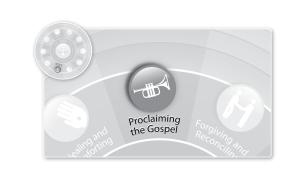 In a guest column for the Christian Post cleverly titled Cheap Law, Tullian Tchividjian warns:
In a guest column for the Christian Post cleverly titled Cheap Law, Tullian Tchividjian warns:
In Matthew 5, Jesus shows unambiguously that the greatest obstacle to getting the gospel is not “cheap grace” but “cheap law” – the idea that God accepts anything less than the perfect righteousness of Jesus…
But, there are some who seek to escape their need for grace and deceive us by lowering the cost of God’s righteousness. They preach a cheap law that sells indulgences to those who pay with the appearance of sanctification.
Problem is, Tchividjian’s stern rebuke ultimately convicts a null set. His concern is for those who, having received salvation solely as the gift of God, are tempted to “trust in some personal display of good fruit to save [their] seat.” He refers to such individuals as “self-sanctifying little sovereigns” who “let the flesh pervert sanctification into the process of needing grace less and less.”
Here, though, a study of the Scriptures indicates that Tchividjian’s concern is misplaced. When Paul, for example, castigates the Galatians for “turning back to those weak and miserable forces” (Galatians 4:9), he portrays this not as a sanctification problem but rather as a justification problem, i.e., they didn’t embrace the gospel of grace in the first place, or they betrayed and abandoned the gospel because they failed to understand it. Witness his passionate exclamation in Galatians 4:19, “My dear children, for whom I am again in the pains of childbirth until Christ is formed in you…”
Translation: When you see someone misunderstanding and manhandling their sanctification, you actually have a justification problem–a “first principles” issue. The problem isn’t that cheap law has crept in to bespoil sanctification. It’s that (Calvinist version) grace never really supplanted sin in the first place or (Arminian version) somebody’s been backsliding. So it’s back to childbirth we go.
And that’s why Tchividjian ultimately succeeds in binding the straw man, not the strong man. Ask yourself: Have you ever met anyone who really embraced and understood and vibrantly lived the justifying gospel according to the Scriptures who viewed sanctification as a process of divesting himself of the need for grace? Talk to such a person and it will quickly become apparent to you both that he failed to fully grasp or put into practice or preserve what you taught him about salvation, and you’d best be bent over double in childbirth on his behalf until Christ is actually and genuinely formed in him.
But all of this is phrased negatively (which, in my view, is one of the problems with Tchividjian’s post and other posts of this type). Let’s flip it around positively and call it “The Justification/Sanctification Postulate”:
When justification by grace occurs in response to a proclamation of the gospel according to the Scriptures, a healthy and biblical practice of sanctification by grace will flow as a matter of course from a healthy and biblical practice of justification by grace.
When I was saved in my late teens, I turned to the person who had just led me through the sinner’s prayer and asked, “So what do I do now?” My guide responded (as Tchividjian does here), “Well, that’s the great thing: You don’t need to do anything.”
That response is true, but trivially so. If I had been asking, “What do I need to do now to maintain my salvation?”, the guide’s response would have been brilliant. But that is not what I was asking. I fully understood that I did not now need to earn what ninety seconds earlier I had clearly received as a gift. What I was asking was, “Now that I have given my life to Christ, how then do I live?”
In response to that question, the guide was seriously unhelpful. I wasn’t seeking to “be a replacement for his Beloved Son,” in Tchividjian’s terminology. Instead, I was simply taking seriously the gift of new life I had just received and wanting to live by it.
Want to avoid an errant practice of sanctification? Then avoid imparting an errant or incomplete understanding of justification. That’s the strong man that really does need to be bound: many churches today don’t know how to proclaim the gospel according to the Scriptures. They conflate the gospel with a testimony, a plan of salvation, or a fire insurance policy, or they prize justification over sanctification, viewing one as necessary and the other as optional. They do not know or embrace or place equal emphasis on each elements of the tripartite formula:
Christ has died.
Christ is risen.
Christ will come again.
This month we’ll be talking about proclaiming the gospel according to the Scriptures. In so doing we’ll be removing the bifurcation too often placed between justification and sanctification. That they are distinct theological processes is undeniable. That you can get one right and yet wildly mess up the other is one of the grave errors of our modern church age.











Pingback: If you happen to run into me 35+ years ago, deliver this letter from me to me | Do the Word
Pingback: If you happen to run into me 35+ years ago, deliver this letter from me to me – Voice of the Martyrs Korea